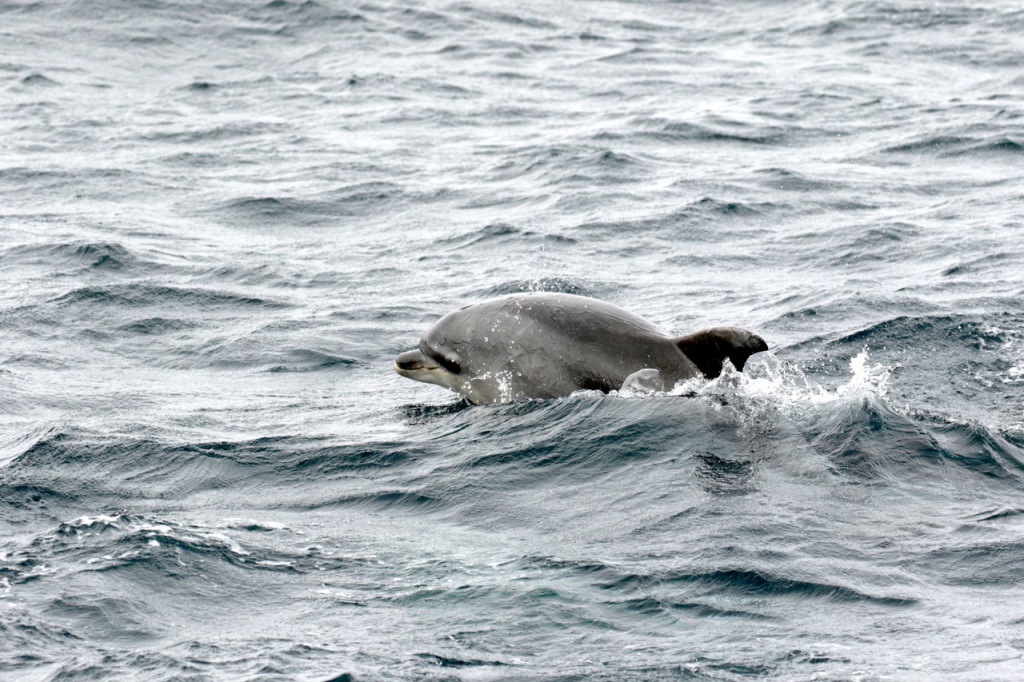Update from our marine conservation volunteering holiday in the Azores archipelago, working on whales, dolphins and turtles
That’s a wrap. The end of the expedition is upon us. Five weeks seems have gone by in a blink of the eye and we must all now slowly head home via various routes. Time genuinely flies when you are having fun, but let me first (briefly) recap the last day at sea, since we still experienced some highs and lows.
On our very last day we were thwarted in our efforts to go to sea by bad weather, but this presented another opportunity to sort more data. The day prior was a great day. Heading many miles south of Pico, we were again treated to encounters with common and bottlenose dolphins, before finding yet more sei whales. These efforts lead us on to multiple sperm whale encounters, with yet more dolphins and the obligatory shark. Though initially a mix of shouts (turtle and shark – shurtle?) were heard (more coffee needed for some!), when the boat circles back around, we could confirm a shark and it does finally prove it is not only the expedition leader that finds the sharks. But better was to come…
Like all good plots, Lisa had saved the best until last – and having been left in charge of the helm – she soon spotted the back of a large whale, and very quickly the shout of ‘blue’ rang out – no confusion this time. Then clear for all to see the blue hue of the largest species ever known, drifted through the water, almost alongside the boat. The silence onboard was deafening. A species you never forget seeing and a species I never tire of seeing. A great way to end what was our last day at sea in 2023.
So that concluded our data collection, though in addition to data, expeditions offer many things, including discovery, difficulty and diversity. The last group have successfully added to and/or experienced all of these, but before we talk about the discovery and data, let me initially offer some thanks. First off, to our groups, who stepped up to the daily challenge of data collection to achieve our goals of better understanding the spatial and temporal distributions of the cetaceans and turtles of the Azores. You’ve all contributed to advancing this knowledge and making this expedition a success.
Let me also offer thanks to Henry who helped get things started this year, and the staff at Biosphere Expeditions, as this project can’t happen without the unseen preparation. I also extend thanks to all in Horta who have supported us, particularly Norberto Divers and our various caterers – whose food was more than fuel! I must also not forget our skipper Siso, who not only took us to sea, but ensured we knew the sea state, wind direction, cetacean locations and always got us back to port safely – thanks Siso. And of course, our enormous collective thanks go to Lisa, our leader in all things scientific. It is indeed a privilege to again share in your world and work with such a dedicated field biologist and cetacean scientist. But my final thanks go to Jim and Claudia who have not only hosted us for the past five weeks, but have supported Biosphere Expeditions for over ten years. Whilst this may be our last year at Banana Manor, your hospitality and garden have been enjoyed by many – and for me it is like second home. Thank you.
This year we’ve again recorded an impressive array of data that without Biosphere Expeditions, wouldn’t have been collected. In case you have forgotten, here are just some of our highlights:
> We’ve deployed four teams into the field, comprising 8 different nations, spanning multiple decades
> We completed 15 days at sea, totalling in excess of 95 hours of surveys, covering over 1500 km of the ocean
> We’ve collected data on at least 10 different cetacean species (5 whale and 5 dolphin species), 1 turtle species (8 individuals), 1 shark species (4 individuals)
> Our total encounters with cetaceans, exceed 170, and yes, simple statistics will tell you that is almost two for every hour at sea
> For the whales, we have already confirmed 46 positive IDs, and 16 re-sights, but also have 27 new flukes – i.e. individuals never recorded before.
In isolation, these may just seem like bits of data, as field research rarely gives us instant results or fast answers to our bigger questions. But we’ve collected a huge baseline of data and the full results will soon become clearer in the expedition report. The power of these data build over time.
So, it has been a successful expedition and the summary statistics highlight some of the success, but success doesn’t just come in the form of empirical data. It is influenced by the people we meet, our expectations, experience and wildlife encounters…to mention a few. We have had a great diversity on all fronts, with three great groups and from my perspective this year did not disappoint in terms of diversity, discovery and data.
For me personally it has been great to have the opportunity to return the Azores, work in this wonderful place and meet old and new friends. Thank you.



































































































